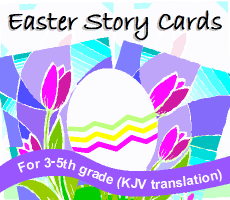Ash Wednesday Lesson
for Children's Ministry
On Ash Wednesday many people will place ashes on their heads, in the sign of a cross, as a sign of sorrow for sinning against God. However, did you know that the practice of placing ashes on people's heads, as a sign of repentance, dates back to Old Testament times?
The Bible tells us the punishment for sinning is death (Romans 6:23). In the Old Testament (before Jesus came to earth), people sacrificed
animals—they put them to death—to take their punishment for sinning. They would then use ashes from the animal sacrifices and place it on their heads as a sign of sorrowful repentance, which means turning from
sin—being truly sorry—turning to God, and asking for his forgiveness.
Hundreds of years before Jesus came to earth, God told the prophet Isaiah to write about a special man who would die for the sins of all people.
Read Isaiah 53:1-12 from a child-friendly Bible, or use the following shortened, Easy-to-Read version:
He grew up like a young plant, like a root growing in dry ground. There was nothing special or impressive about the way he looked, nothing we could see that would cause us to like him.
People made fun of him, and even his friends left him. He was a man who . . . bore our pain. But we thought that God was punishing him, that God was beating him for something he did. But he was being punished for what we did. . .He was treated badly, but he never protested. He said nothing. . .He never opened his mouth to defend himself. He was taken away by force and judged unfairly. . . He had done no wrong to anyone. He had never even told a lie . . .But the Lord was pleased with this humble servant who suffered such pain. Even after giving himself as an offering for sin. . .The Lord says,
'My servant, who always does what is right, will make his people right with me; he will take away their
sins. . . He was considered a criminal, but the truth is, he carried away the sins of many. Now he will stand before me and speak for those who have
sinned.'
This passage of Scripture is known as the Suffering Servant passage. It is about Jesus, because he suffered and died in our place to forgive our sins. No longer do we need to offer animal sacrifices. Jesus died once, for all people (Hebrews 10:28).
He took the punishment we deserve for sinning against Holy God. That is what is meant when we say, Jesus paid for our
sins; he paid with his life!
Ash Wednesday marks the beginning of the season of Lent, and ends with the greatest event in history, the day we celebrate the Resurrection of our Lord
Jesus: Easter Sunday!
What is Lent? (Lent means "lengthening" as in the lengthening of days in springtime. It is the 40-day period leading up to Easter, not counting Sundays, because they are considered
mini-Easters or Resurrection Sundays. It is a time for Spiritual renewal or refreshing.)
Why do you suppose Lent is 40 days long? (To remember that Jesus was tempted for 40 days and 40 nights in the
desert; he denied himself—he didn't give into Satan's temptations. Jesus was without sin!)
Read Matthew 3:16-4:11 from a child-friendly Bible.
What does it mean to deny self? (To not give into temptation. To turn away from anything that would limit or hinder your relationship with Jesus. To look to others needs over your own.)
What can be gained by fasting during Lent, or anytime for that matter? (By denying ourselves of something we enjoy eating or
doing—that's what is meant by fasting—we identify with Jesus' denial of self. Then, when we are tempted to eat or do that thing we are
"giving up," we can think about what Jesus did for us, and then pray and thank him for denying himself and for going to the cross for us, so we can be forgiven of our sins and live with God for eternity!)
Food
Activity: Make Prayer Pretzels
(While the Prayer Pretzels bake, cut out paper crosses and continue with the Confession Activity.)
Confession Activity
Let us prayerfully think about the sins in our lives, and then write them on our cross. (Tell children this is between them and God; no one will see what they write.)
Read King David's prayer of confession from Psalm 51:1-12. (Have an ADULT
carefully burn the paper crosses in a large metal pot or fire pit. Allow to cool, then use the ashes to mark cross-shapes on children's foreheads.)
If time allows, play a pantomime game using key words from Psalm 51 (e.g. God - love - you - sin
- wisdom - cleanse - evil - joy - hide - wash - face - bones - heart). Have one person act out the word. The person that guesses correctly acts out the next word. When you're finished playing the game, eat your Prayer Pretzels.
Close in prayer.
Copyright 2011 Sarah A. Keith
Learn more about Ash Wednesday and why it is observed.
Check out our Easter Resources for Children's Ministry


You can make a
difference!
Your purchases
and donation
to the site help to distribute
our children's ministry resources to churches across the world.
Subscribe to our Newsletter - Learn More